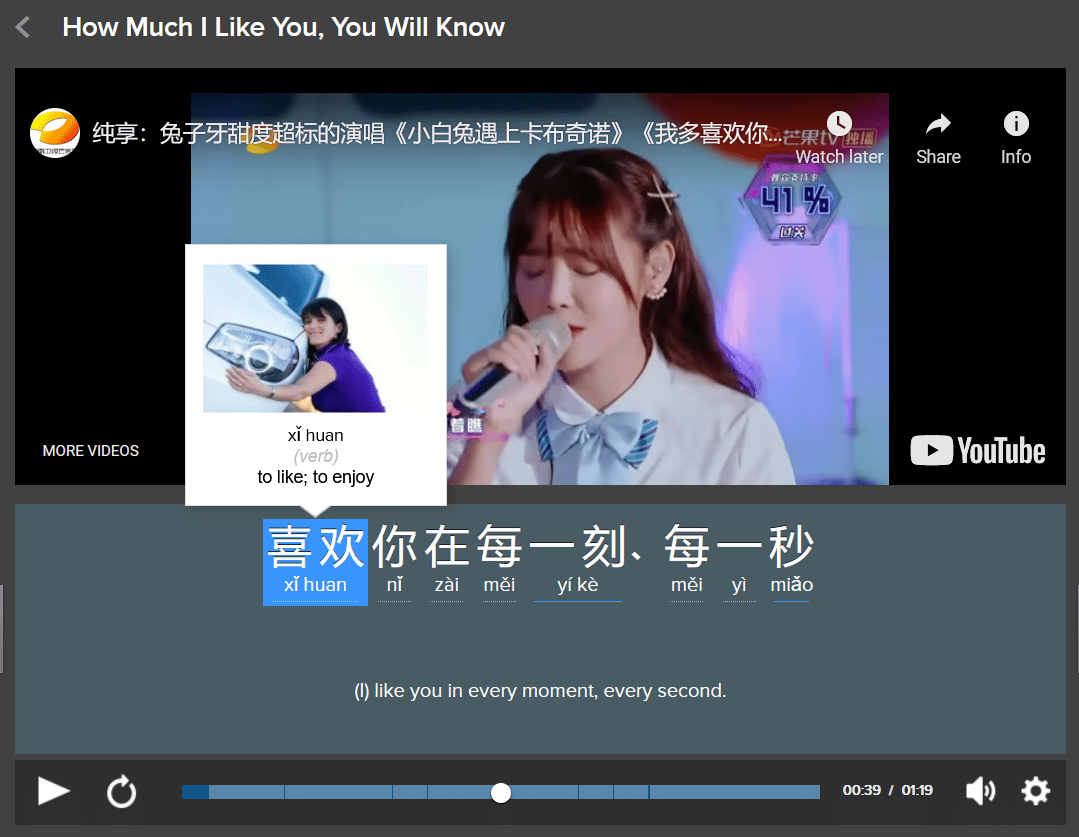How to Say I Love You in Chinese with 18 Phrases, Plus Gestures

There are so many more ways to say “I love you” in Mandarin Chinese than just 我爱你 (wǒ ài nǐ).
In China, you’d mostly use other, less straightforward expressions to show your love and affection. Let’s dive in deeper and look at some different ways to share romantic feelings in Mandarin.
Contents
Download: This blog post is available as a convenient and portable PDF that you can take anywhere. Click here to get a copy. (Download)
Phrases to Say “I Love You in Chinese”
我爱你 — I love you
Pinyin: wǒ ài nǐ
This is the most literal way to say “I love you” in Mandarin, but be careful with this one. The phrase isn’t commonly used in traditional Chinese culture. Western culture has influenced the younger Chinese generation, so it’s a bit more common now. But you’ll still rarely ever hear it in media.
While you may be accustomed to telling your friends, partners and family members that you love them, Chinese families are not very vocal or direct when it comes to their affection for their loved ones.
Naturally, saying 我爱你 to someone from China might come across as strange, and that person might react in a way that’s less than ideal.
Romance isn’t really embedded into Chinese culture the way it is in many other cultures. While English-speaking cultures often make a big deal out of who says “I love you” first, Chinese couples generally don’t really care.
我喜欢你 — I like you
Pinyin: wǒ xǐ huān nǐ
This phrase is typically meant romantically—you wouldn’t really say it to friends.
In fact, it’s often used when you’re confessing your feelings for someone. You can also say it casually to someone you’re already dating if 我爱你 would come off as too strong.
我好想你 — I miss you so much
Pinyin: wǒ hǎo xiǎng nǐ
This works with close friends, loved ones and significant others. The milder version of it would be 我想你 (wǒ xiǎng nǐ), which simply means “I miss you.”
我为你疯狂 — I am crazy about you
Pinyin: wǒ wèi nǐ fēng kuáng
If you’re extremely infatuated with someone, this might be one phrase you’ll want to practice!
我只属于你 — I only belong to you
Pinyin: wǒ zhǐ shǔ yú nǐ
You’ll usually hear this in Chinese love songs and dramas. Of course, you can also flip it around: 你只属于我 (nǐ zhǐ shǔ yú wǒ) — “You only belong to me.”
我爱你一生一世 — I love you for life
Pinyin: wǒ ài nǐ yī shēng yī shì
This is a very romantic phrase, to the point that it even has its own holiday.
In 2013, January 4 was declared as “Love You Forever” day. That day was such a big deal because the date 2013/1/4 in Mandarin was 二零一三一四 (èr líng yī sān yī sì), which sounds similar to this phrase.
That holiday was literally a once-in-a-lifetime event, and thousands of couples rushed to get hitched on the historic date.
爱你 — Love ya
Pinyin: ài nǐ
The difference between 我爱你 and 爱你 is the equivalent of “I love you” versus just “love you” or “love ya” in English. It’s not as serious and can be used between close friends and family.
The full 我爱你 has very romantic implications, so when you want to say “love you” to your best friend, for example, you can opt for just 爱你.
Phrases for Confessing Feelings and Intentions
我暗恋你 — I have a crush on you
Pinyin: wǒ àn liàn nǐ
暗恋 means liking someone romantically, but secretly—the other person doesn’t know.
我希望和你交往 — I’d like for us to go on a date
Pinyin: wǒ xī wàng hé nǐ jiāo wǎng
This is a straightforward way to ask someone out! Aside from 交往, you can also say 约会 (yuē huì).
我想跟你在一起 — I want to be with you
Pinyin: wǒ xiǎng gēn nǐ zài yì qǐ
在一起 literally means “to be together” in Mandarin, so use this phrase when you’re ready to get serious with someone or you’re already committed to each other.
我想吻你 — I want to kiss you
Pinyin: wǒ xiǎng wěn nǐ
Be careful with the tones for this! 吻 means “kiss”—but make sure to say it with the third tone. The other person might mistake what you’re saying for 问 (wèn) and assume you’re just going to ask them a question.
Chinese Slang for Saying “I Love You”
爱老虎油 — I love you
Pinyin: ài lǎo hǔ yóu
This slang expression is a transliteration of the English “I love you,” and it’s a lighthearted way of sharing your feelings. You’ll often read it online or in a chat.
一三一四 / 1314 — Forever
Pinyin: yī sān yī sì
Number slang is also common via text or online. As you can see from the last two phrases, the Chinese are very big on creating slang by using similar sounds between numbers and other words.
一三一四 / 1314 is a homophone of the above-mentioned 一生一世, meaning “forever” in English.
五二零 / 520 — I love you
Pinyin: wǔ èr líng
五二零 / 520 is a homophone of 我爱你. When texting someone, you can actually just send them a message with 520 in it, and they’ll understand that you’re saying you love them.
This led to Chinese Internet Valentine’s Day, created by netizens a few years back on May 20th (5/20). Women often expect gifts or red packets on this day, so be prepared!
五二一 / 521 — I love you
Pinyin: wǔ èr yī
520 is much more popular, but 五二一 / 521 has romantic associations because it also sounds very similar to 我爱你. Chinese Internet Valentine’s Day is also celebrated on May 21.
五二零一三一四 / 5201314 — I’ll love you forever
Pinyin: wǔ èr líng yī sān yī sì
If 520 isn’t enough, you can go above and beyond with 五二零一三一四 / 5201314! It’s based on an expression we’ve mentioned already: 我爱你一生一世.
You can also shorten this to 2013 to sound like 爱你一生 (ài nǐ yì shēng), which has roughly the same meaning as the full phrase.
七七零 / 770 — Kiss you
Pinyin: qī qī líng
This number slang, 770, is a reference to 亲亲你 (qīn qīn nǐ), where 亲 means “kiss.”
八八零 / 880 — Hug you
Pinyin: bā bā líng
This phrase, literally 880, comes from 抱抱你 (bào bào nǐ). 抱 means to hug someone.
But if you really want to do as the Chinese do, here are some gestures to express your love for your Chinese significant other.
Gestures to Show Love in Chinese Culture
Show love with gifts rather than with words
The Chinese are all about showing your love as opposed to confessing your love. And showing your love is often done with gifts and financial provisions.
This may seem superficial to those from Western cultures, who often believe that personal sacrifices like time, energy and effort are strong indications of love.
In China, wealth is seen as stability for the future, which aligns with Chinese ideals about love. China’s history of extreme poverty shaped the social norms of correlating affection with money.
Celebrate all the Chinese romantic holidays
If you thought Valentine’s Day was excessive, wait until you hear about all the romantic holidays in China!
The Chinese might not say “I love you” outright, but they sure have lots of calendar days celebrating their love for one another.
Days to shower your Chinese partner with flowers, chocolates and other gifts include:
- International Valentine’s Day, on February 14.
- Double Seventh Festival, or 七夕节 (qī xī jié), a traditional festival celebrating a legend of forbidden love on the seventh day of the seventh month of the lunar calendar.
- Chinese Internet Valentine’s Day, as mentioned above, on May 20 and 21.
Share the love with food
In Chinese culture, love isn’t always said out loud—and you can see this even with Chinese parents.
By now, you’ve probably already seen the Pixar short “Bao.”
Chinese and other Asian people rejoiced because they felt the animated feature perfectly reflected the kind of relationships they had with their own parents.
As Chinese-Canadian director Domee Shi explained with Xinhua, “Traditionally, Chinese parents don’t say, ‘I love you’ to their kids. They say it with food or by fussing over them.”
Food is so important to Chinese culture that a traditional greeting is 你吃饭了吗? (nǐ chī fàn le ma?), which means “How are you?” but is literally “Have you eaten?”
Because of this, you can definitely use food as a gesture of affection—you might cook dinner for your significant other, bring them their favorite food or invite them to a family meal. It might seem more subtle, but they’ll likely get the message and feel appreciated.
You’ll see how people in China show their love and will hear many of the phrases above and even the “L-word” in Chinese pop songs and dramas. For example, 我喜欢你 shows up in a popular song from the drama “A Love So Beautiful”:
The screenshot above is from FluentU, where you can watch native Chinese videos. FluentU takes authentic videos—like music videos, movie trailers, news and inspiring talks—and turns them into personalized language learning lessons. You can try FluentU for free for 2 weeks. Check out the website or download the iOS app or Android app. P.S. Click here to take advantage of our current sale! (Expires at the end of this month.)
Love is a tricky business, isn’t it?
If you’re adamant about saying “I love you” in Mandarin the literal way, by all means, go for it. Just be prepared for the possibility of strange looks, a bit of laughter and maybe some comments about you being crazy or drunk.
Download: This blog post is available as a convenient and portable PDF that you can take anywhere. Click here to get a copy. (Download)
If you want to continue learning Chinese with interactive and authentic Chinese content, then you'll love FluentU.
FluentU naturally eases you into learning Chinese language. Native Chinese content comes within reach, and you'll learn Chinese as it's spoken in real life.
FluentU has a wide range of contemporary videos—like dramas, TV shows, commercials and music videos.
FluentU brings these native Chinese videos within reach via interactive captions. You can tap on any word to instantly look it up. All words have carefully written definitions and examples that will help you understand how a word is used. Tap to add words you'd like to review to a vocab list.
FluentU's Learn Mode turns every video into a language learning lesson. You can always swipe left or right to see more examples for the word you're learning.
The best part is that FluentU always keeps track of your vocabulary. It customizes quizzes to focus on areas that need attention and reminds you when it’s time to review what you’ve learned. You have a 100% personalized experience.
Start using the FluentU website on your computer or tablet or, better yet, download the FluentU app from the iTunes or Google Play store. Click here to take advantage of our current sale! (Expires at the end of this month.)And One More Thing...












